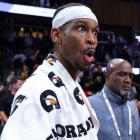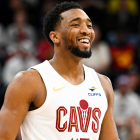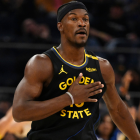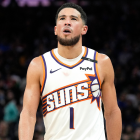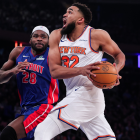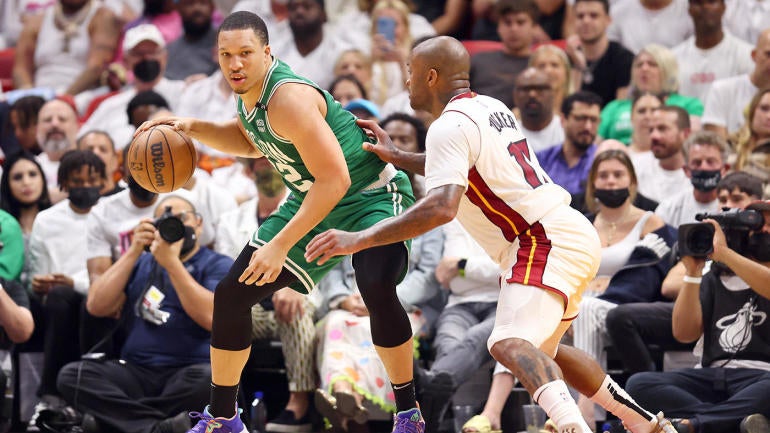
In December 2018, the Houston Rockets' pulled up to a hotel in Memphis at about the same time as the University of Tennessee men's basketball team arrived. This serendipitous scheduling meant that P.J. Tucker could catch up with Rick Barnes, his college coach. It also meant that Grant Williams, then a junior, could meet the guy his coach was always talking about.
"P.J. stopped and spent some time with him and told him how his job was to defend," Barnes said in an interview over the phone. "And both of them were great scorers in college. I mean, both of them could go get buckets for you. But P.J. told him how it took him a long time to figure out how he's going to have to change his game to do what he needs to do in the NBA as a defensive guy and had to make corner 3s."
Barnes remembers Tucker telling Williams about his big plans for the evening: Watching film. Tucker, then in his 13th season playing professional basketball, would guard Jaren Jackson Jr. for the first time the following night, so he needed to familiarize himself with the rookie's game.
Tucker was already familiar with Williams'. Eleven months earlier, Williams had scored 37 points in a win against Vanderbilt, prompting Tucker to text Barnes to say he liked what he saw.
Of course he did. From the moment Barnes first saw Williams play, he reminded the coach of Tucker. Months after they met in Memphis, in the lead-up to the NBA Draft, Williams compared himself to Tucker in interviews with teams and reporters.
Now both of them are playing heavy minutes in the Eastern Conference finals. Tucker's primary responsibility is to hound Boston Celtics star Jayson Tatum all over the court. Williams' is to stand his ground against Miami Heat star Bam Adebayo, just like he did against Giannis Antetokounmpo for seven games in the second round.
"I see them playing against each other right now, it's a lot of pride," Barnes said. "Because they deserve everything that people say about them, because they have fought the odds every step of the way. And when it's all said and done, they're gonna have the last say."
Neither the 37-year-old Tucker, who is from Raleigh, North Carolina, nor the 23-year-old Williams, who is from Charlotte, were recruited by the major colleges in the state. Tucker won Big 12 Player of the Year in his junior season at Texas, and Williams won SEC Player of the Year as a sophomore and a junior at Tennessee.
"They have more in common than people might know," Barnes said.
The similarities are obvious, now that Williams has pestered Kevin Durant on the perimeter in the playoffs and developed into a 40-percent shooter from the corners. Initially, though, when Barnes watched Williams at an AAU tournament, he thought of Tucker for a different reason.
"They were way overweight, both of 'em," Barnes said.
But when Barnes watched them play, he saw "high, high, high-level competitors." He saw potential, provided that they were willing to work to transform their bodies.
"A lot of people questioned them being undersized and this and that, but they competed and they won," Barnes said. "They seemed to always win. And you saw enough when you saw them compete that it's there, but they don't do it consistently enough because, again, they were overweight, out of shape."
Tucker arrived in Austin the summer before his freshman year. He went straight from class to his first on-court workout, which was strenuous and unpleasant.
"P.J. threw up," Barnes said. "And called his mother and said, 'I don't think I can do this.'"
It was not clear at that moment that, 11 games into his collegiate career, Barnes would be telling a North Carolina newspaper that Tucker had "made a big, big difference for our team this year." He was leading the Longhorns in both scoring and rebounding, and, according to the Greensboro News and Record, he was 30 pounds lighter than his high school playing weight.
To this day, Barnes laughs about Tucker's vomitous start "every time I see him," he said. Tucker had come straight from class, and he had not yet eaten.
Tucker has said that Barnes "taught me how to play hard" and "how to be a teammate." When Barnes won the Naismith College Coach of the Year Award in Williams' junior season, Tucker credited Barnes in an Instagram post for for pushing him; he could "have 25 and 20," and, in a film session, Barnes would remind him that he left four rebounds on the table. "I came with the hunger," Tucker wrote, "but you showed me how to fine tune it to become a beast!"
Barnes used to call Williams "bobblehead" because, when he was tired, he'd bob his head as he ran on the treadmill. Barnes dispensed tough love in private and public; after a come-from-behind win, Barnes told reporters that Williams was too emotional, too immature and too inconsistent, that he could be a special player but needed to toughen up. Williams, a freshman, was standing in the back of the room.
Tucker served as a model for Williams. "I used to tell Grant all the time that P.J.'s arguably the most competitive guy I've ever coached," Barnes said. Eventually, thanks to all of the extra work he'd done in what Barnes called Fat Camp, Williams would finish top five in every sprint and lift up teammates who were struggling. After bad games, when a brutal film session was coming, Williams would tell Barnes, "Put it on me today."
"I could get on both of them a lot," Barnes said. "One reason I could get on 'em: they could take it, not only for themselves but for the entire team. They both didn't mind taking it. It would roll off their back, and they would be ready to go the next play."
Barnes called both Tucker and Williams fun to coach, prideful, resilient and confident. On the court, they are both fundamentally sound, extremely intelligent and absolutely fearless on defense.
And they do not shut up.
"Maybe the two best talkers I've ever been with," Barnes said, "in terms of not just talking nonsense, but really locked into the game, truly knowing game plan. Not only did they know their job, they know what their teammates are supposed to be doing."
The advantage that Williams has, however, goes back to the conversation that Tucker and Williams had in Memphis: It took Tucker years to find his niche. When Tucker declared for the draft in 2006, the term "3-and-D" did not exist. In three years at Texas, he attempted four 3-pointers.
"I had told P.J. that, 'Hey, you should come back to school because you need to learn to shoot the ball from the perimeter,'" Barnes said. "His idea was, 'Why do I need to shoot the ball? I can score against anybody I want anytime inside. And you you know what, he was right."
Tucker led a team with LaMarcus Aldridge on it in points and shot attempts, but NBA teams were not looking for a 6-foot-5 post scorer. Drafted No. 35 overall by the Toronto Raptors, he spent much of his rookie season in what was then known as the D-League. Toronto waived him weeks before the playoffs, and Tucker spent the next five years overseas: Israel, Ukraine, back to Israel, Greece, Italy, Germany.
Defense only became his calling card when he got his second chance with the Phoenix Suns in 2012. Tucker didn't open his corner office immediately; in his first year with the Suns, he shot 0.9 3s a game.
By the time the 6-6 Williams was preparing for the draft, Tucker had battled countless 7-footers, closed conference finals games as a smallball center and, along with Draymond Green, changed the game. Barnes encouraged him to watch Tucker's tape.
Barnes told him, "You can do a lot of things that P.J. Tucker did, but you have yet to prove that you guard like he can,'" he recalled. Williams was a solid defender in college, but he wasn't the strong, switchable stopper that he has turned into in Boston. "He's come a long way."
If it were easy to play like Tucker, there would be a lot more players like him. The average prospect is not built like a linebacker, light on his feet and lights out from long range. In his junior year, Williams made just 32.6 percent of his 3s and shot them at low volume. Throughout his time at Tennessee, though, he worked on his jumper, and he was not deterred when he missed the first 25 3-point attempts of his NBA career. As a rookie, he shot 10 for 17 from deep in the playoffs and clinched a trip to the conference finals with a stop against guard Fred VanVleet on the final possession of Game 7.
With a more consistent stroke and improved lateral quickness in Year 3, Williams has broken out and become a full-fledged playoff hero. Quietly, Tucker has gotten better, too, becoming a weapon in the short roll by making floaters and finding Miami's shooters. What they share, more than anything, is the ability to adapt, so they can stay on the floor and help their teams win.
"In the case of Grant, as time goes on, he'll continue to work at his game and continue to add, just like P.J. did," Barnes said. "They both will allow their egos to make the adjustment they need to make to be successful for as long as they have to to be a factor in the game. Because I think they both love the game that much."
![[object Object] Logo](https://sportshub.cbsistatic.com/i/2020/04/22/e9ceb731-8b3f-4c60-98fe-090ab66a2997/screen-shot-2020-04-22-at-11-04-56-am.png)









